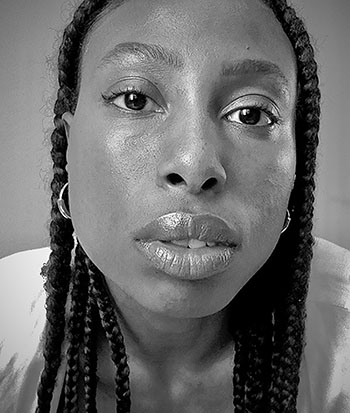Ways of Witnessing Black Motherhood: Spectacles of Suffering, Mortal Rebellions, and the Tyranny of Love with Jan-Therese Mendes, PhD

Please join us for the 2022 Annual Lecture, School of Gender, Sexuality and Women’s Studies featuring Dr. Jan-Therese Mendes.
Date: Friday, March 11, 2022
Time: 11:30 am – 1:30 pm (EST)
Dr. Mendes holds a PhD in Social and Political Thought from York University, Canada. Mendes was the 2020-2021 visiting scholar with the Amsterdam Research Centre for Gender and Sexuality at the University of Amsterdam and is currently a postdoctoral fellow in studies of gender and race with the Centre for Gender Studies at the University of Stavanger. Mendes is a Black feminist media studies scholar whose research interrogates how affects are machinated against Black and Black Muslim bodies and desires within Northern welfare nations. Invoking frames of analyses from Black political theory, Black visual culture, feminist theory, and Islamophobia studies, Mendes’ past and present work examines themes such as, Black mournability and human exile; the Black womb and reproduction; pedagogies of assimilation and humiliation; as well as the possibilities of willfulness and witnessing found through AfroDiasporic visual and performance art.
Lecture Description:
In the winter months bracketing 2019 two Black mothers were the objects of short-lived media frenzies in the Northern welfare states of Sweden and Norway. One woman, heavily pregnant, is arrested by a brutally apprehending authority that nearly terminates the fetus; while the other has allegedly chosen to end her life and that of her children in the frigid Nordic Sea. Engaging with these two media case studies through a lens informed by Black feminist and Black political theories’ readings of Black death, pain, and exile from the human, this lecture attends to the ways the Black maternal is publicly disciplined in the wake of her distress and held criminally accountable even from the unreachable place of death. By interrogating the affects surrounding either Nordic happening, I examine how the injury endured by the gestating body and the uncertainty that surrounds the watery death remains ever secondary to the injury the unruly Black migrant mother inflicts on the decorum of white public space and the demands of national assimilation. Going beyond the recounting of the familiar spectacle of Black suffering, this lecture shifts towards an otherwise by asking: What else can be witnessed through these grim events? What other affects or unanticipated forms of willfulness might we apprehend? Turning briefly to slavery’s archive of reproductive rebellions and the refusal of unliveable life, I contemplate the possibilities of witnessing Black maternal love in the very sites that public discourses envision the deviance and psychosis of the “bad Black mother.” And yet, refusing a turn to love as a fruitful rehabilitation of the Black mother this lecture uses autoethnography to experimentally contemplate the tyranny of a mothering goodness, the relief of maternal death, and the work of badness without antithesis for Black mothering subjects.
